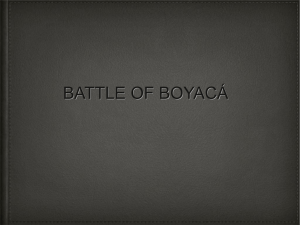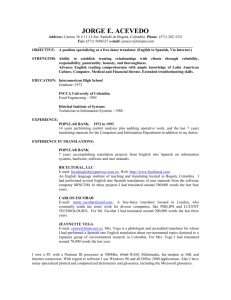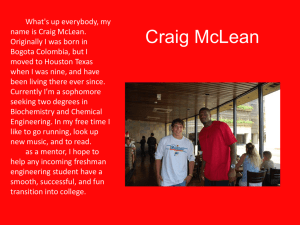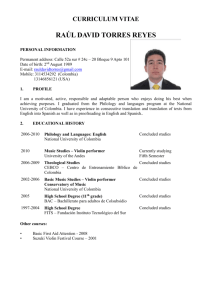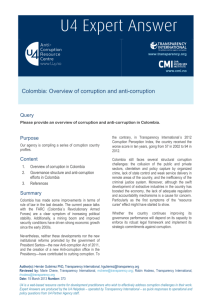Ran Goel – Bogota, Colombia, Transparencia por Colombia
advertisement
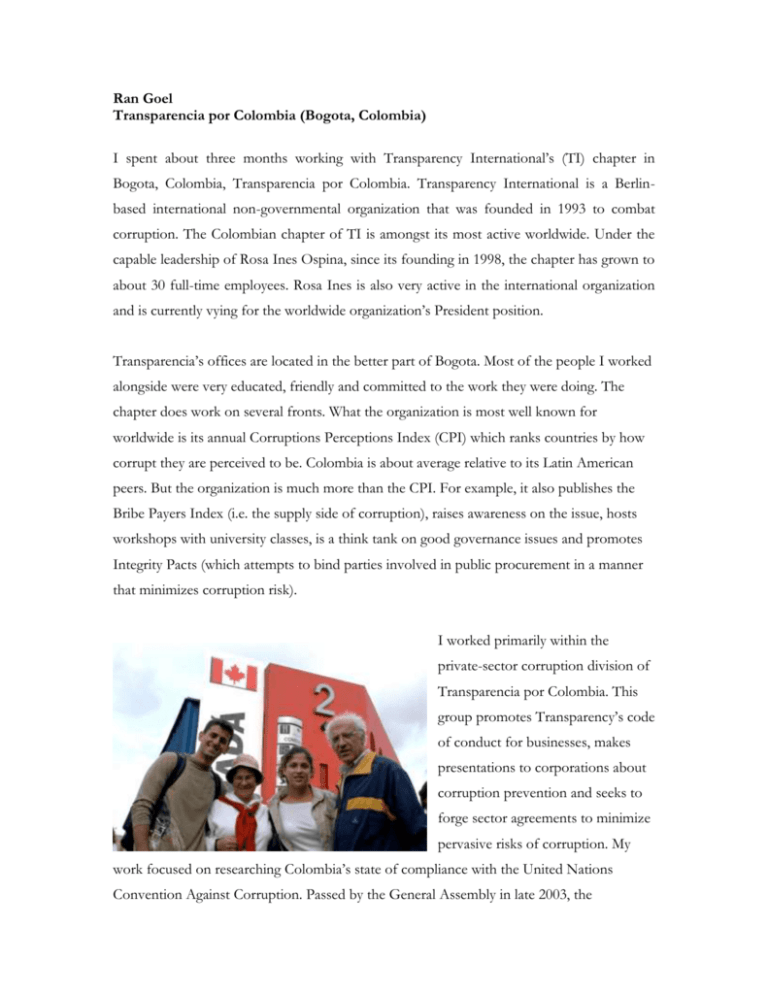
Ran Goel Transparencia por Colombia (Bogota, Colombia) I spent about three months working with Transparency International’s (TI) chapter in Bogota, Colombia, Transparencia por Colombia. Transparency International is a Berlinbased international non-governmental organization that was founded in 1993 to combat corruption. The Colombian chapter of TI is amongst its most active worldwide. Under the capable leadership of Rosa Ines Ospina, since its founding in 1998, the chapter has grown to about 30 full-time employees. Rosa Ines is also very active in the international organization and is currently vying for the worldwide organization’s President position. Transparencia’s offices are located in the better part of Bogota. Most of the people I worked alongside were very educated, friendly and committed to the work they were doing. The chapter does work on several fronts. What the organization is most well known for worldwide is its annual Corruptions Perceptions Index (CPI) which ranks countries by how corrupt they are perceived to be. Colombia is about average relative to its Latin American peers. But the organization is much more than the CPI. For example, it also publishes the Bribe Payers Index (i.e. the supply side of corruption), raises awareness on the issue, hosts workshops with university classes, is a think tank on good governance issues and promotes Integrity Pacts (which attempts to bind parties involved in public procurement in a manner that minimizes corruption risk). I worked primarily within the private-sector corruption division of Transparencia por Colombia. This group promotes Transparency’s code of conduct for businesses, makes presentations to corporations about corruption prevention and seeks to forge sector agreements to minimize pervasive risks of corruption. My work focused on researching Colombia’s state of compliance with the United Nations Convention Against Corruption. Passed by the General Assembly in late 2003, the Convention was ratified by Colombia in summer 2005. While the Convention addresses corruption at large, my work focused on those aspects that dealt with so-called private-toprivate corruption i.e. with no public agent involved. This is a much understudied and underemphasized form of corruption – the overwhelming focus is usually on public officials involved in shady dealings. So most of my time was spent in the office, at law school libraries and interviewing some judges and lawyers to gather information on the state of the law. Overall, my experience was amazing, but I definitely have learned some lessons. 1. Get Out There – I would personally highly recommend that interns work where the ‘problem’ they are interested in originates be it corruption, religious discrimination or child sex tourism. This is not to say that going to Geneva, London or New York isn’t a worthwhile affair. But there’s nothing like getting a sense of what happens on the ground. 2. Language Competency – This is perhaps obvious. My Spanish was decent when arrived in Colombia, but it was severely challenged by the type of work I was doing – intensive legal research. I would have had a much easier time if I was in an internship with less intensive research involved i.e. merely conversational. That said, my Spanish did improve much more as a result. 3. Pick your Organization with care – While I did feel I was contributing at Transparencia, I think my contribution would perhaps have been much more pronounced at a smaller and less well funded NGO. Since anti-corruption and good governance are very much in vogue at the international organizations (IMF, World Bank, UN) and is fairly ideologically neutral (everyone is against it), the organization enjoys (for the time being anyhow) relatively stable and plentiful funding. 4. Pick your Work with care – Related to the above, I felt that three months was way too short to get a decent handle on the radically different legal and socio-political context in Colombia. The quality of my final report was undoubtedly affected by this. It bothered me personally because I’m a perfectionist with these sorts of things. That said, much depends on your outlook – I still learned a lot. The take away from this is that you should pick work where you are going to be able to contribute at a level/quality that you’re comfortable with. 5. Safety – Colombia and many other countries are not for everyone. Don’t go somewhere where you aren’t comfortable with the safety risk level. Indeed, going somewhere dangerous can be somewhat counter-productive depending on your risk tolerance – you may end up gating yourself up in an expatriate community or a touristy area and defeat one of the main purposes that you may have chosen to intern in that country in the first place i.e. getting to know a culture and working closely with locals. Unfortunately, this is not gender or race neutral. 6. Be Ready for Surprises – You have to be flexible. In my case, Transparencia was under the incorrect assumption upon my arrival that I was a completely fluent Spanish speaking lawyer, although I had expressly indicated otherwise on my resume. Be ready to switch NGOs or positions within an NGO if need be. 7. Pre-Trip reading – I would highly recommend reading informally (nothing academic) about the country you are heading to. This could range from reading online papers to reading its famous authors to reading about its music stars. It will only enrich your experience.
